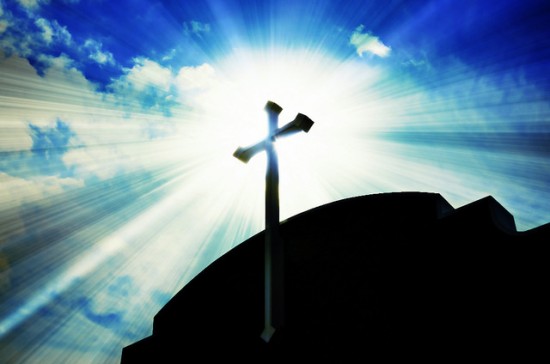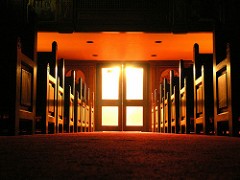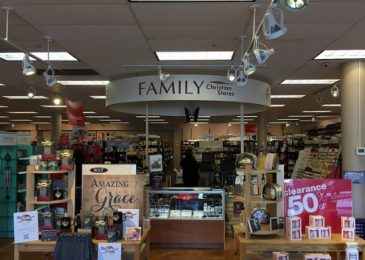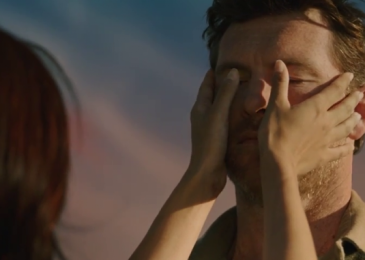Photo by Art4theglryofGod Photography By Sharon, Flicker, CC Licensing.
I promise we’ll get back to movies shortly. Given the events of this week, I wanted to post this, originally from my Facebook account. It has been edited for length.
I am surprised how angry and depressed I felt seeing the election results. To think that Donald Trump is the next President of the United States still seems unreal. I have no clue how a man with such a short fuse and no political experience will govern. I’m terrified.
Tuesday afternoon, I posted on Facebook that people shouldn’t be sore losers. That God is in control no matter who wins. Wednesday morning, I was a hypocrite. I went on a Facebook rampage, tearing into Trump supporters, wanting them to see just how stupid I thought they were. It was a mistake. It was anger and bile of the same stripe that won Trump this election. And as I reflect, I realize that what troubles me most about is not that Donald Trump can be president; it’s that there is a sickness in America that has made us angry, vindictive, hateful and self-involved. Its crosses party lines and ideologies. And I’m just as susceptible.
I thought we were better than to elect a man who has bragged about sexual assault, trashed minorities, bullied others and cheated his way to our highest office. I was wrong. There’s nothing people won’t do when power is at stake. And given my belief in original sin, I shouldn’t have been surprised. However, I’m disturbed that this support has come overwhelmingly from the evangelical community. I feel like a man without a home.
I don’t know that I can overstate role evangelicalism has played in my life. I grew up in a strong Christian family, surrounded by a legacy of faith that treated church not as a chore or an authority, but as a family. My parents taught me to be excited to be part of church. It’s where our best friends were. It’s where we hoped to meet our spouses. To be part of it was a joy. My parents befriended staff members, had people over late at night to pray, and taught me that the church was a good place. I didn’t have friends from my high school; I had my youth group. I didn’t go on Spring Break; I went on a missions trip. Even when things got ugly, there was the overriding belief that it was worth fighting for.
Evangelism enveloped me with its music, books and culture. As a teen, I wasn’t allowed to listen to “secular” music, and so I turned to bands like dc Talk, Audio Adrenaline and the Newsboys. I read the “Left Behind” books and “Campus Life” magazine. I never got into the movies (big surprise), but I always thought that maybe, one day, I’d make the first good one (we’re still waiting). Even when I laughed off its tone-deafness and dips in quality, I always tempered my criticism with the reminder that at least the artists’ intentions were pure. Evangelical culture might be awkward, but the goal was love, right? I was taught that’s what Christianity meant. To love people, give them hope, care for the forgotten, and show compassion to those in need.
I no longer believe that’s what evangelicalism stands for.
Photo couresty wagdi.co.uk, C.C.
My skepticism started setting in about 10 years ago when I took a second job working at Family Christian Stores. I began to see that evangelical culture was an industry, designed to make a profit and keep people coming back for more. Books were written to convince evangelicals of their prominent place in society but also make them feel threatened over oncoming (and mostly nonexistent) persecution. Music was made to give them fuzzies and a warm glow that could be interpreted as spiritual, but wasn’t meant to convict or help process doubt; stores needed to sell joy to keep people buying. People like Jerry Falwell and James Dobson aligned the cross with conservative politics and, on the other side, progressive authors traded the cross for social justice, not realizing that for the Church to be effective, it must be free of party entanglements.
What’s been the result? Pastors who’ve used the pulpit for power and exploited their congregations’ trust, sacrificing the gospel in favor of a nonexistent culture war. A segment of Christian faith that is indistinguishable from a political party that has to contort its doctrines, compromise its integrity and apply spiritual principles to the most minute political platforms. A Christianity that is isolated, terrified of threats that don’t exist, pursuing power and position it’s never been promised, equating America with the Kingdom of God, and so interested in its own protection that it loses the love, compassion, humility and sense of reckless abandon that have made it unique for two millennia.
It’s that perfect storm that led evangelicals to overwhelmingly elect Donald Trump to the nation’s highest office. Fear of Muslims led them to support a man who promised to keep them out. Promises of prosperity caused them to harden their hearts to the less fortunate. A commitment to unborn life (which is commendable) combined with an ambivalence toward what happens to that life after the womb caused them to support a candidate whose position on that very issue is sketchy at best. Fear of being marginalized allowed them to give anger a place over integrity and character. It let them elect a man to office who is a bully, a misogynist, a racist and a cheat. Had the vote gone the other way, we could likely still write about compromises Christians had to make.
It broke my heart to see a culture that had formed so much of my identity aligning itself with someone so clearly on the other side. I couldn’t comprehend the way so many of my friends and family members were voting. I felt alone, unable to identify with a culture that had been so vital to my life.
>Was it a sin for a Christian to vote for Donald Trump? As much as I’d love to say yes, I can’t. Our reasons for voting are complex; only God knows our intentions. The church must be a place with room for the gun-loving conservative and the bleeding-heart liberal. We must hold each other accountable when we compromise our beliefs or give in to anger and fear. We must be humble enough to admit that our party doesn’t have a monopoly on the truth, and that voting through a glass darkly means our man-made politics will never perfectly align with the gospel. It’s nuanced.
Photo by Dwight Stone, Flickr. CC Licensing.
And evangelicals are bad with nuance. It’s hard to navigate areas that don’t have clear-cut answers because evangelicalism has taught us that we’re right and that there are easy one-size-fits all responses (easier to sell the book). Instead of urging us to engage the Bible, wrestle with theology and confront our doubts, evangelical culture has taught us doubting is wrong, the Bible is easy to understand, and theology is all about “asking Jesus into our heart” and then finding an answer that is easily applied. In the process, it’s isolated us. It’s made us angry and fearful, and hardened our hearts to compassion. We snipe and snap, we argue and yell. We’re angry and bitter. And the more I look, the more I see that depending on American evangelicalism or even progressive Christianity for spiritual identity is just a good way not to develop the fruit of the spirit.
I have a hunch that any attempt to shrink Christianity down to fit a demographic is just going to dilute it, pervert it and lead to more problems. So, I’m not going to try. I’m done. I’m not an evangelical. I don’t know what that word means anymore in association with Christianity. It’s a political buzzword, a demographic. But the more I look at the Bible, the less it looks like Jesus. I’m not evangelical, progressive, or any other catch-all phrase. I love Jesus. I follow him. He is my identity.
So I’m not done with church or with Jesus. On the contrary; I need them now more than ever. I need church because I need the reminder that my faith is bigger than politics, bigger than ideologies, and bigger than me. I need a body of people who I love, both when it’s easy and when it’s difficult. This election brought out the dirty side of America, and I’m included in that. I need the church to remind me of the great mess inside me and the great hope in Christ.
In the coming years, people who the church has ignored and mistreated are going to need to be convinced that we love them. In a nation that has turned its back, the church is going to need to open its arms. It’s going to have to set the tone for compassion and healing, and it’s going to have to be the refuge for the disenfranchised, neglected, abused and ignored. The church will need to prove that it’s a home for minorities, refugees, and gay men and women. What does this look like? I don’t know; it means were going to have to learn how to love unconditionally and be militantly compassionate. We’ll have to navigate nuanced issues, being a welcome place for people who don’t share our beliefs or live like us. We must learn to love and accept without compromising biblical values. It’s uncharted territory. It’s scary. It’s risky.
It’s the church.







